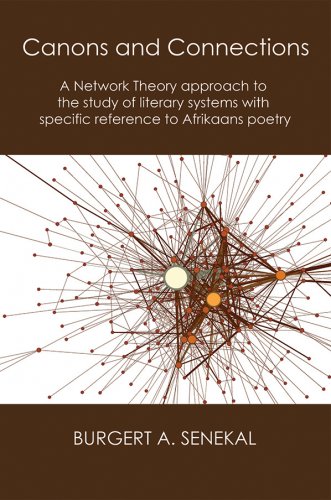
About the Author
Since 2008, Burgert A. Senekal has been affiliated with the University of the Free State (UFS), and is currently a researcher at the Centre for Language Facilitation and Empowerment. He obtained a Master’s degrees in in Afrikaans and one in English, He recently completed his PhD in Afrikaans at the UFS. After his initial publications within the framework of alienation theory, his recent research interests include systems theory, network theory, and information technology, especially where it can be harnessed to analyze complex social and cultural systems.
CANONS AND CONNECTIONS: A Network Theory approach to the study of literary systems with specific reference to Afrikaans poetry
Burgert A. SenekalNew Academia Publishing, 2014
172 Pages, 57 Illustrations
ISBN 978-0-9904471-6-0 Paperback
For BULK ORDERS, order directly from New Academia Publishing.
Queries: orders@newacademia.com
About the Author
Since 2008, Burgert A. Senekal has been affiliated with the University of the Free State (UFS), and is currently a researcher at the Centre for Language Facilitation and Empowerment. He obtained a Master’s degrees in in Afrikaans and one in English, He recently completed his PhD in Afrikaans at the UFS. After his initial publications within the framework of alienation theory, his recent research interests include systems theory, network theory, and information technology, especially where it can be harnessed to analyze complex social and cultural systems.
About the book
The study of literary systems or fields is a well-established approach, particularly in reference to Afrikaans literature. Of course, agents in social systems make their own decisions, but as a whole, decisions about what is considered ‘literature’ are made within the system itself. No single entity can be responsible for a poet’s position in the center of the network: It is through the combined efforts of all role players that works become central or peripheral in the literary system. This study takes a new look at the literary system from the perspective of network theory. It is shown how the literary network shares important topological features with other complex networks, and at the node level, the book discusses who the key players are in the contemporary Afrikaans poetry network from 2000 to 2012, based on degree-, betweenness-, and closeness centrality. It is also shown how an entity’s overall position at the core or on the periphery can be established, and through some examples, the book illustrates how the relationships between poets, critics, scholars, publishing houses, newspapers, websites, journals and magazines all contribute to an entity’s overall position in the network. As such, the book aims at a more quantitative analysis of a literary system.
Praise
“Senekal’s study not only explains the value and impact of network theory but also shows to what extent the literary discourse consists of more than the mere literary text under discussion. A major advantage of Senekal’s study is that he presents complex issues and theories in a clear and informed manner. He relates the theoretical approach to everyday social media phenomena such as Facebook and Twitter but always has the main goal in mind, namely the analysis of literary systems relating to Afrikaans poetry.”
—Dr Marius Crous, Department of Language and Literature, NMMU, South Africa
“With this book, the author convincingly demonstrates ways in which a network theory approach, and software developed to assist Social Network Analysis (SNA), may be utilized to quantify findings resulting from more qualitative studies of the positions, actions and value of role-players (works, individuals, institutional instruments) in a literary polysystem. Objective quantification of such findings concerning Afrikaans poetry/literature has indeed been lacking in the past.”
—Bernard J. Odendaal, North-West University, Potchefstroom Campus





 Coming Soon
Coming Soon Awards
Awards